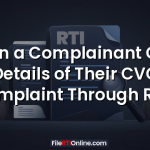Can You Find Out Why You Were Not Selected for a Job Through RTI?
(With CIC Case Example on Higher-Marks Candidate Rejection)
Many job applicants wonder:
“Can I use the Right to Information (RTI) Act to find out why I was not selected?”
“If I scored higher marks, why did someone with lower marks get selected?”
The Central Information Commission (CIC) has repeatedly held that you can ask for the recorded reasons behind a rejection or non-recommendation—especially in government recruitment. This article explains what information you can legally get and uses a real CIC case relating to the Staff Selection Commission (SSC) as an example.
What Information You Can Seek Under RTI About Recruitment
Under the RTI Act, you can ask for:
- Your evaluation details
- Your mark sheets / score sheets
- Cut-off marks
- Eligibility criteria applied
- File notings related to your candidature
- Reasons recorded for declaring you “not suitable” or “not recommended”
You cannot ask for the PIO’s opinion or an explanation that does not exist in the records.
But you can ask for copies of the documents where the reasons are already recorded.
CIC Case Example: Candidate With Higher Marks Not Selected
Background of the Case
A candidate applied under RTI to the Staff Selection Commission (SSC) regarding the 2011 Hindi Translator recruitment. She wanted to know why a specific candidate (ID No. 2201500057) with 296.50 marks was not recommended even though:
- The last selected candidate had 265.50 marks (CSOLS)
- Another selected candidate had 271.25 marks (Ministry of Defence)
The Public Information Officer (PIO) simply said:
“No additional candidates were under consideration.”
This did not clarify anything.
What the Appellant Sought
During the hearing, the appellant asked:
- Why was the higher-scoring candidate not recommended?
- If there are reasons in SSC records, the same should be disclosed.
This is a valid RTI request because it asks for existing file records, not opinions.
CIC’s Observation
The CIC found the request reasonable.
Recruitment bodies like SSC maintain:
- Verification remarks
- Eligibility confirmation
- Reservation category mapping
- Suitability notes
- Document discrepancies
- Any rejection/shortlisting reasons
Therefore, SSC was expected to locate these records and share them.
CIC’s Decision
The CIC directed the PIO to:
- Re-examine the case
- Retrieve all relevant documents
- Provide photocopies showing the actual recorded reasons for non-selection of the higher-scoring candidate
This could include notings, DV remarks, eligibility issues, or any file entries used to reject her candidature.
What This Case Proves
1. You CAN find out why you were not selected
If a government body has recorded a reason, RTI can reveal it.
2. Higher marks do not guarantee selection
Other factors may apply:
- Category-wise cut-off
- Essential qualification issues
- Document mismatch
- Typing/skill test performance
- Suitability test
- Reservation policies
RTI can help you verify whether these were applied correctly.
3. Recruitment transparency is enforceable
CIC consistently supports applicants who seek:
- Reasons for rejection
- Internal criteria
- Shortlisting processes
4. You cannot ask for “why you failed” unless it is documented
Only existing official records are accessible under RTI.
When You Can Use RTI to Know Why You Were Rejected
You can file RTI if:
- You attended a government recruitment exam
- You appeared for document verification but were rejected
- Someone with lower marks was selected
- Your result shows “not recommended” or “not suitable”
- You applied for a post in any public authority (SSC, UPSC, RRB, PSU, State Govt, University, etc.)
When RTI Will Not Help
RTI cannot disclose:
- Personal details of other candidates
- Internal deliberations that do not exist on record
- Private company recruitment reasons
- Psychometric/medical details of other candidates
- Documents held not covered under RTI
Conclusion
Yes — you can use RTI to find out the documented reason why you or any candidate were not selected for a government job.
The CIC case on the SSC Hindi Translator exam clearly shows that authorities must disclose:
- File notings
- Eligibility findings
- Suitability remarks
- Any rejection-related entries
If it is written on record, RTI can reveal it.


